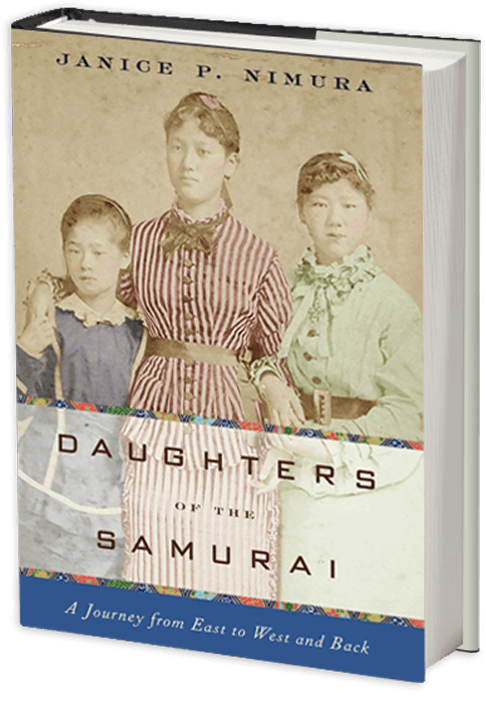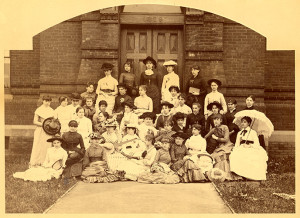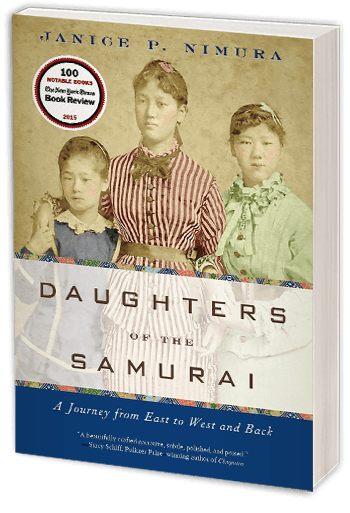
In 1871, five young girls were sent by the Japanese government to the United States. Their mission: learn Western ways and return to help nurture a new generation of enlightened men to lead Japan. Raised in traditional samurai households during the turmoil of civil war, three of these unusual ambassadors—Sutematsu Yamakawa, Shige Nagai, and Ume Tsuda—grew up as typical American schoolgirls. Upon their arrival in San Francisco they became celebrities, their travels feted by newspapers across the nation. The passionate friendships they formed reveal an intimate world of cross-cultural fascination and connection. Ten years later, they returned to Japan—a land grown foreign to them—determined to revolutionize women’s education.
Based on in-depth archival research in Japan and in the United States, Daughters of the Samurai is beautifully, cinematically written, a fascinating lens through which to view an extraordinary historical moment.
Trailer
Praise & Reviews
New York Times Notable Book 2015
Buzzfeed Best Nonfiction of 2015
Seattle Times Best Books 2015
Booklist Top 10 Multicultural Nonfiction
“Beautifully written…In Nimura’s deftly interwoven account, the three girls emerge as contrasting types, like Chekhov’s ‘Three Sisters.'”
—New York Times Book Review read full review
“[Nimura’s] descriptions of landscapes are poetic, and you’d be hard-pressed to find a novelist who is as deft at portraying relationships and inner thoughts…She skillfully bridges Japanese and American cultures, using the seemingly small story of three young people to tell a much larger tale of another time.”
—Washington Post read full review
“In Daughters of the Samurai, Janice P. Nimura achieves the elusive dream of the historian, producing a work that will engage and satisfy academic and non-specialist audiences alike… Daughters of the Samurai is, perhaps, less a story of Japanese out of place in their country, than of women ahead of their time.”
—Los Angeles Review of Books read full review
“Nimura’s exhaustively researched historical biography is as immersive as any work of fiction, heart-wrenching in its depiction of these cultural orphans turned pioneers.”
—Oprah.com read full review
“Nimura has written a superb history… This remarkable and beautifully written story—often as riveting as a page-turning novel—is both scholarly and accessible to non-specialists.”
—Seattle Times read full review
“Set aside ample time: You won’t welcome intrusions while reading this unprecedented, true story… Daughters proves memorably illuminating, a unique story full of firsts.”
—Christian Science Monitor read full review
“Daughters of the Samurai reads like a novel about the meeting of East and West and how it transformed the lives of three extraordinary young women.”
—Dallas Morning News read full review
“Engagingly told…a poignant tale of ordinary girls who made history.”
—Deseret News read full review
“Superbly evokes 19th and early 20th century Japan, and to a lesser extent the 19th century United States, through the lives of these three remarkable women, who so dramatically influenced the evolution of their homeland.”
—Asian Review of Books read full review
“Through her fascinating tapestry of history and biography, New York scholar Nimura weaves the strange, vibrant tale of an insular nation coming to terms with currents of modernism it could no longer keep out….An extraordinary, elegantly told story of the beginning of Japan’s education and emancipation of its women.”
—Kirkus Reviews (starred) read full review
“Independent scholar Nimura has written an exquisite collective biography… A captivating read for biography lovers, readers interested in America’s Gilded Age or late Meiji Japan, and fans of Arthur Golden’s Memoirs of a Geisha.”
—Library Journal (starred) read full review
“Nimura brings the girls and their late nineteenth-century exploits to life in a narrative that feels like an international variation on Louisa May Alcott’s Little Women, so very appealing and delightful are their historic stories.”
—Booklist (starred) read full review
“Through the sensitive weaving of correspondence and archival papers, Nimura produces a story of real-life heroines in this masterful biography of three samurai daughters sent to the U.S. after the Civil War.”
—Publishers Weekly read full review
“The real strength of Nimura’s book lies in her ability to zoom and pan with the smoothness of a master historian… This is a finely crafted book, painterly in its attention to small detail but poised in its ability to deal with the complexities of geopolitical wrangling and great-state diplomacy.”
—The University Bookman read full review
“At a reform-minded moment, Japan in 1871 dispatched five young girls to be educated in America. None spoke a word of English. Two would count among Vassar’s first non-white students; all sailed home with a shaky grasp of their native language. Patiently, vividly, Janice Nimura reconstructs their Alice-in-Wonderland adventure: The girls are so exotic as to qualify as ‘princesses’ on their American arrival. One feels ‘enormous’ on her return to Japan. A beautifully crafted narrative, subtle, polished, and poised.”
—Stacy Schiff, author of Cleopatra: A Life and Vera: Mrs. Vladimir Nabokov, winner of the Pulitzer Prize in Biography
“Daughters of the Samurai reads like a novel that happens to be true: three girls uprooted by fate, bridging the gulf between the elegant rhythms of Old Japan and the exhilarating opportunities of America. Janice Nimura paints history in cinematic strokes and brings a forgotten story to vivid, unforgettable life.”
—Arthur Golden, author of Memoirs of a Geisha
“Daughters of the Samurai tells the riveting story of three remarkable girls, caught in the maelstrom of one of the strangest culture clashes in modern history. Janice Nimura captures both the broad sweep of social movements as well as the intimate details of these girls’ lives, filling in gaps and holes in history that we didn’t even know were there. Touching on cultural hybridity, multiculturalism, women’s education, Daughters of the Samurai is history writing at its finest and required reading for anyone interested in Japan.”
—Ruth Ozeki, author of A Tale for the Time Being
“In this surprising and richly satisfying story of three young girls chosen to act as cultural ambassadors, Janice Nimura masterfully details their lives on two continents while simultaneously introducing readers to the half-century that forced the ancient Land of the Rising Sun to confront Western modernity. In Nimura’s skillful telling, Sutematsu, Ume, and Shige become ambassadors once again, bringing to life an era from which we can learn important lessons about intercultural understanding, conflict, and compromise, still vital to our survival in the global 21st century.”
—Megan Marshall, author of Margaret Fuller: A New American Life, winner of the 2014 Pulitzer Prize in Biography






